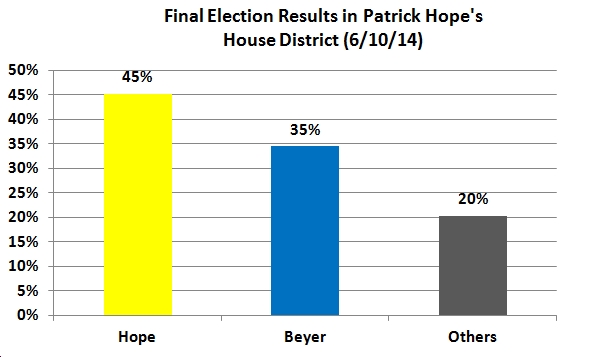 Also, I talked to Hope campaign manager Ben Tribbett, and he pointed to the Washington Post's May 24 endorsement of Beyer as accounting for most, if not all, of Beyer's gain in Hope's district. Basically, in Tribbett's view, a lot of voters in Hope's district liked both Hope AND Beyer, were trying to decide between those two candidates, and the Post endorsement was the tie-breaker in favor of Beyer (if it had been the other way around, Hope probably would have won his district by a significantly wider margin than he did, in Tribbett's view). Seems like a reasonable explanation to me, albeit kind of a pathetic one, given my almost complete lack of respect for the Post's editorial board or its Virginia endorsement "process" (in quotes because it's a complete joke; it's also really just one guy, Lee Hockstader, who never even comes to Virginia to cover any events). Also, I talked to Hope campaign manager Ben Tribbett, and he pointed to the Washington Post's May 24 endorsement of Beyer as accounting for most, if not all, of Beyer's gain in Hope's district. Basically, in Tribbett's view, a lot of voters in Hope's district liked both Hope AND Beyer, were trying to decide between those two candidates, and the Post endorsement was the tie-breaker in favor of Beyer (if it had been the other way around, Hope probably would have won his district by a significantly wider margin than he did, in Tribbett's view). Seems like a reasonable explanation to me, albeit kind of a pathetic one, given my almost complete lack of respect for the Post's editorial board or its Virginia endorsement "process" (in quotes because it's a complete joke; it's also really just one guy, Lee Hockstader, who never even comes to Virginia to cover any events).What about the other candidates, besides Hope and Beyer? They went from a combined 8% of the vote in the 47th House of Delegates district on May 1 to 20% of the vote in the actual election, an increase of 12 points combined. Most of those votes went to Ebbin (9%) and Levine (6%), who received a combined 15% of the vote in Hope's House district. Ebbin gained about 6 points from the May 1 Blue Virginia poll, while Levine increase by about 5 points. Of course, the 28% undecided made up their minds who to vote for, or decided not to vote. It appears that Beyer picked up almost all his extra 14 points out of those 28 points. The remaining 13.5 percentage points of the undecideds, plus the 2.2% for the two candidates who ended up dropping out, were mostly distributed to Ebbin and Levine. P.S. Ben Tribbett also pointed out that Hope performed the worst in precincts where he had never really run a competitive race, following 2011 redistricting. For instance, Beyer won the Park Lane district by a 106-58 margin over Hope. |
